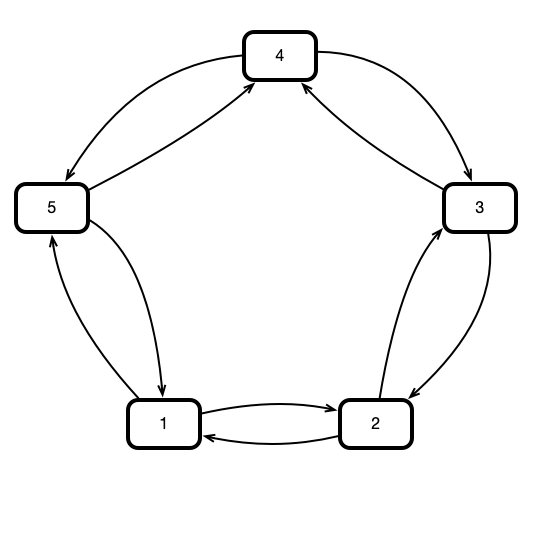Lecture 07: Concurrent Objects 2
Announcements
- Quiz 2 posted
- Homework 2 posted in next couple days
- Accountability group survey linked to today
Outline
- Linked Lists, Again
- Blocking and consistency
Last Time
Linked list with concurrent insertions:
- Lock individual nodes
- Can perform concurrent insertions when nodes don’t overlap
Concurrent Insertions

Acquiring Locks

Both Insert

Both Release

What Happens with Contention?

Red Acquires Locks (Blue Waits)

Red Inserts & Releases Locks

Blue Finally Acquires Locks

Blue Inserts & Releases Locks

A Slightly Different Scenario

Question
Are multiple concurrent insertions guaranteed to eventually succeed?

Blocking and Consistency
Morals from Previous Examples
- Locking whole object (linked list)
- easy to reason about correctness
- may give poor performance
- Locking individual parts
- may give better performance
- more challenging to reason about correctness
A Queue
public class LockedQueue<T> {
int head, tail;
T[] contents;
Lock lock;
...
public void enq(T x) {
lock.lock();
try {
items[tail} = x;
tail++;
} finally {
lock.unlock();
}
}
public T deq() {
lock.lock();
try {
T x = items[head];
head++;
return x;
} finally {
lock.unlock();
}
}
}
Question
What makes this queue implementation easy to reason about?
Executions are Essentially Sequential!
If multiple threads access the queue
- only one thread actually modifies queue at a time
- other threads must wait
- this property is called blocking:
- some method calls cannot make progress while others perform a task
Another Question
Queues are first-in first-out (FIFO) data structures
What does FIFO even mean if objects can be enqueued concurrently?
Blocking Execution
Consider:
- Two threads A, B concurrently call
enq(x),enq(y), respectively - Then thread A calls
deq()
What is expected behavior?
What Happens?
Depends on how concurrent operations are resolved!

Equivalent Sequential Execution

In Sequential Execution
Method calls are linearly sorted:
- Method calls:
- invocation
- response
- Each call’s response preceeds next call’s invocation
Reasoning About Sequential Executions
- Assume object in some state
- precondition
- Method specifies
-
postcondition
- return value
- change of internal state (side effect)
-
postcondition
Method calls performed sequentially $\implies$ state well defined between method calls.
- Specifying pre/post-conditions for each method define object’s sequential specification
Reasoning About Concurrent Executions
“Correct” behavior no longer well defined!

- call to
deq()could return eitherxory- both reasonable!
A Reasonable Goal
A concurrent execution of a data structure is “correct” if it is consistent with some sequential execution of the data structure.

Response to each method call in concurrent execution is the same as the sequential execution.
- What other features of concurrent execution can/should the sequential execution maintain?
Our Goal
Define sensible qualities for how executions should behave:
- Sequential consistency
- Linearizability
These are less rigid requirements than being essentially sequential
- May allow for less synchronization (locking) between threads
- Tradeoff: more lenient behavioral guarantees
Sequential Consistency
A Sensible Feature
Consider all method calls made by all threads
- Each method has precondition, postcondition
Behavior of execution should be consistent with some sequential execution of the method calls.
Is This Enough?
Behavior of execution should be consistent with some sequential execution of the method calls.
Probably Not!
Queue with multiple threads:
- thread 1 calls
enq(1)thenenq(2) - other threads enqueue stuff, not
1or2 - thread 1 calls
deq()a bunch of times
Should have:
- thread 1 dequeues
1before2
Another Sensible Feature
Method calls should appear to take effect in program order
- if a single thread calls
methodOne()beforemethodTwo(), thenmethodOne()should take effect beforemethodTwo()in sequential execution.
Sequential Consistency
An execution is sequentially consistent if all method calls can be ordered such that:
- they are consistent with program order
- they meet object’s sequential specification
An implementation of an object is sequentially consistent if
- it guarantees every execution is sequentially consistent
Example
What are possible outcomes of deq() calls in a sequentially consistent execution?
